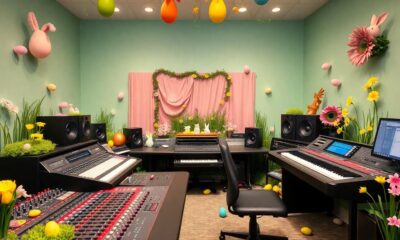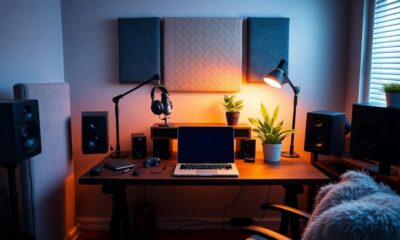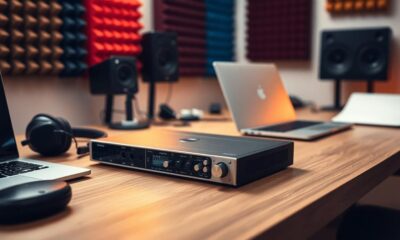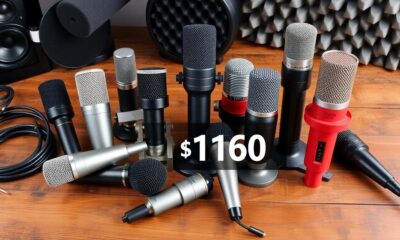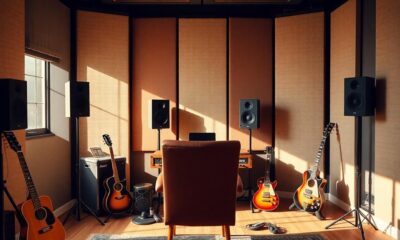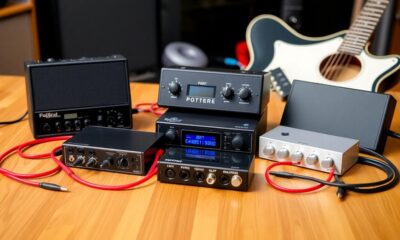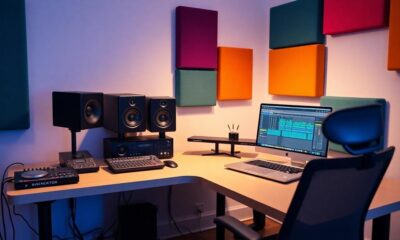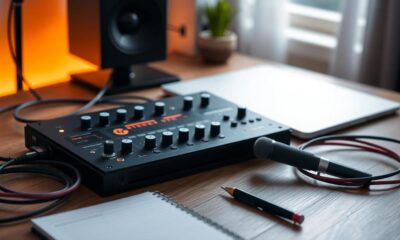Music Production
How to Be a Better Music Producer: Tips and Tricks!
Hone your music production skills with expert tips and tricks to elevate your craft and unleash your creative potential.
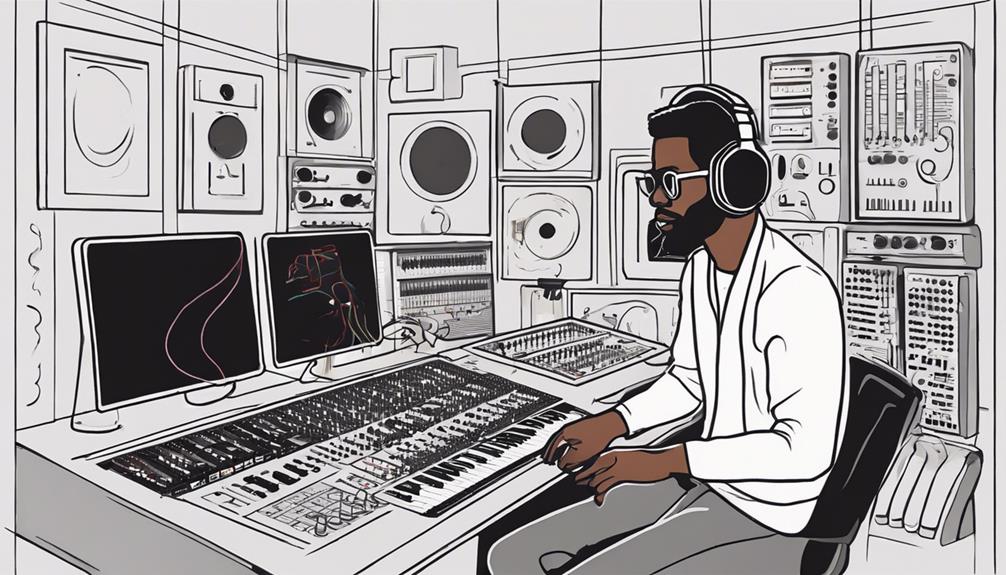
Improve your music production skills by mastering your DAW tools, optimizing workflow efficiency, and experimenting with effects. Prioritize completing tracks over seeking perfection, embrace creativity by exploring diverse genres and fostering a musical mindset. Focus on simplicity and quality, remembering that less can be more impactful. Aim for continuous improvement through practice and seeking feedback. Trust your instincts, learn music theory, and build an efficient workflow. Balance variation and repetition strategically for dynamic music. For more in-depth tips and tricks, keep exploring the expert advice provided to enhance your music production journey.
Key Takeaways
- Experiment with different genres and styles for fresh inspiration.
- Prioritize workflow efficiency with structured plans and deadlines.
- Seek feedback to refine skills and embrace continuous improvement.
- Embrace simplicity and quality over complexity.
- Trust instincts, take risks, and stay authentic in creative decisions.
Mastering Technical Skills
To improve as a music producer, focus on mastering the technical skills essential for creating high-quality tracks. Production involves understanding your digital audio workstation (DAW) tools thoroughly to optimize workflow efficiency. Familiarize yourself with features such as automation, track routing, and plugin integration to streamline your creative process and work more efficiently.
Enhancing your mixing skills is vital for achieving a professional sound. Learn techniques like sub-mixing and collective processing to balance frequencies, create depth, and polish your tracks. Experiment with different effects and tools to understand how they affect the overall sound of your music.
Sound design plays a significant role in making your tracks stand out. Explore techniques such as re-amplification and white noise manipulation to add texture and excitement to your productions. By incorporating unique sound elements, you can create a signature style that sets your music apart.
Additionally, incorporating composition strategies like utilizing silence as a musical element can help you evoke emotions and create dynamic tension in your tracks.
Mastering these technical skills will elevate the quality of your music productions and help you grow as a music producer.
Prioritize Workflow Efficiency
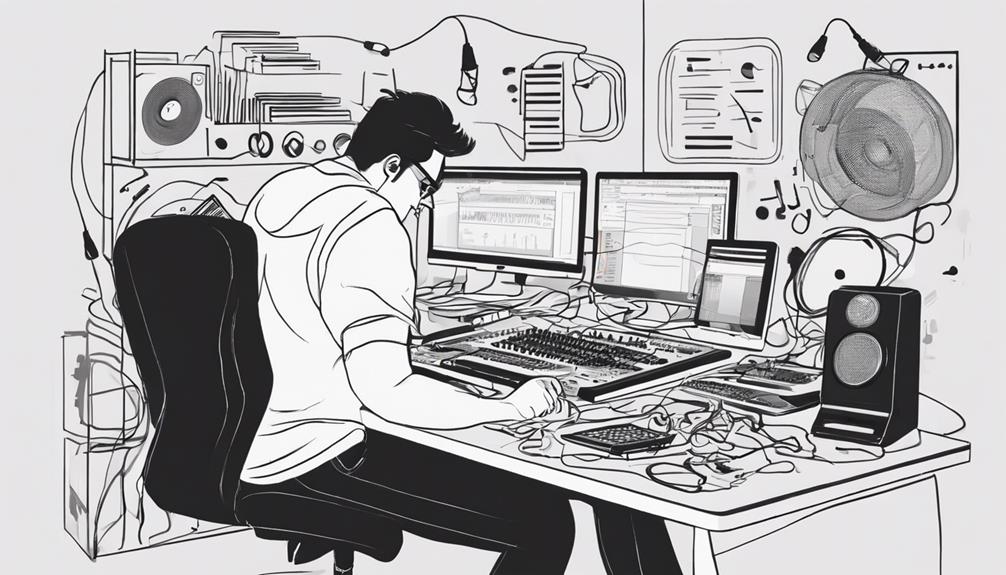
Prioritize workflow efficiency by implementing strategies to optimize your music production process effectively.
To enhance your music production workflow, take regular breaks every 15-20 minutes to prevent ear fatigue and maintain focus.
Focus on completing tracks rather than aiming for perfection to boost efficiency and productivity.
Create a structured plan and set deadlines for each production session to stay organized and maximize your output.
Utilize feedback lists for your work-in-progress projects to track improvements and guarantee you complete essential tasks.
Remember to maintain flexibility by keeping your projects open to changes and adjustments for a streamlined workflow.
By following these steps, you can improve your efficiency, stay on track with your music production goals, and produce high-quality finished tracks more consistently.
Prioritizing workflow efficiency is key to becoming a more effective music producer.
Embrace Creativity and Exploration
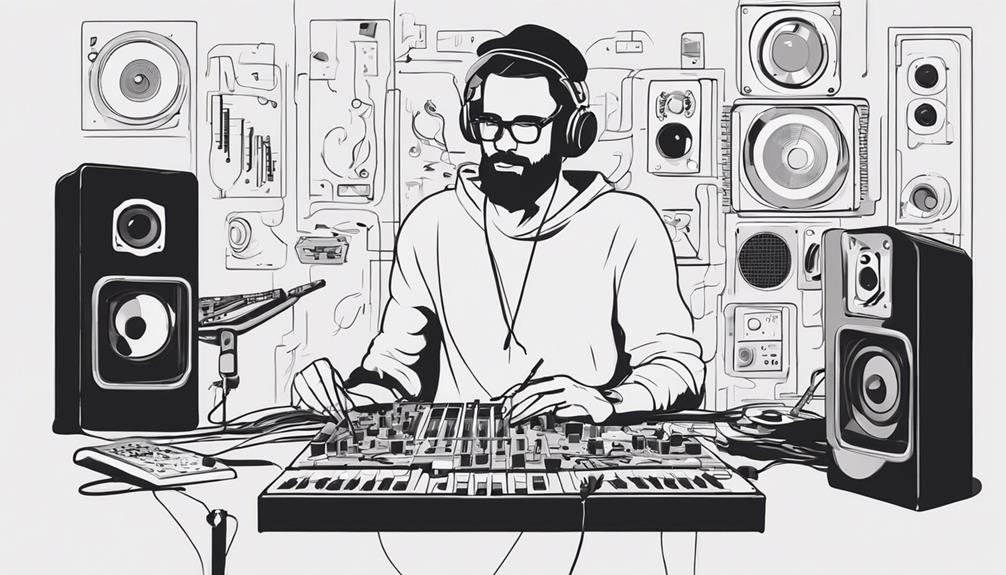
To become a better music producer, embrace creativity and exploration in your work.
Cultivate an artistic mindset that encourages musical experimentation by blending diverse elements in your compositions.
Keep pushing boundaries by incorporating stolen elements from different styles to create unique and authentic music.
Cultivate Artistic Mindset
Embrace creativity and exploration in your music production to cultivate an artistic mindset that thrives on innovation and authenticity. Learning to blend diverse elements and experiment with different genres can spark new ideas and push the boundaries of your sound.
By staying true to your artistic identity and avoiding conforming to industry standards, you can create music that resonates authentically with your audience.
Here are four tips to help you cultivate an artistic mindset in your music production:
- Blend Diverse Elements: Experiment with combining different sounds, instruments, and techniques to create a unique sonic experience.
- Explore Various Genres: Step out of your comfort zone and explore new musical styles to inspire fresh ideas and foster innovation in your production.
- Embrace Authenticity: Connect with your audience by staying true to yourself and infusing your music with genuine emotions and experiences.
- Stay Innovative: Draw inspiration from a variety of sources and don't be afraid to borrow ideas or incorporate elements from different genres to keep your music fresh and exciting.
Foster Musical Experimentation
Cultivating an artistic mindset through embracing creativity and exploration in your music production sets the foundation for fostering musical experimentation. Experimenting with different genres and styles can spark fresh creativity, leading to innovative approaches in music production.
By incorporating stolen elements and diverse influences into your music, you can generate unique ideas that set your tracks apart.
To truly innovate in music production, it's essential to push boundaries and explore new sound design techniques. Breaking traditional rules can open up a world of possibilities and help you expand your sound palette. Techniques like using white noise and re-amplification can add energy and depth to your tracks, creating a more dynamic listening experience.
Embracing simplicity and authenticity is key to creating music that reflects your true artistic identity. By staying true to yourself and experimenting with diverse influences, you can engage in meaningful musical experimentation that drives your creativity to new heights.
Strive for Simplicity and Quality
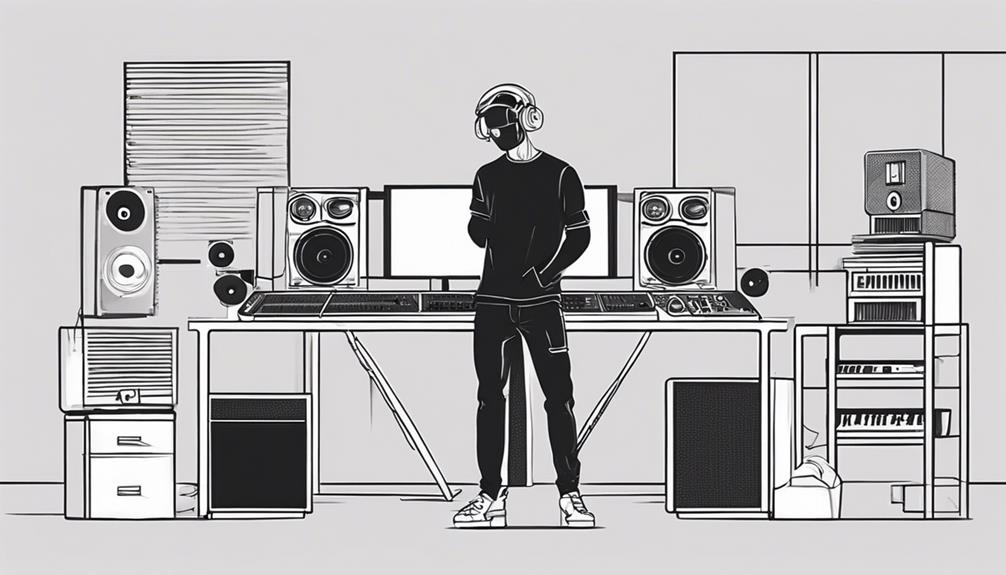
When aiming for simplicity and quality in your music production, keep in mind that simple beats can have a big impact.
Prioritize quality over quantity by focusing on clear sounds and meticulous editing.
Simple Beats, Big Impact
Aim to create simple beats with impactful elements to make a lasting impression on your audience. When focusing on quality over complexity, your music production will maintain a professional sound that resonates with listeners.
To achieve this, consider the following tips:
- Prioritize Quality: Concentrate on the quality of your beats rather than the quantity of elements in your composition. A few well-crafted sounds can have a more significant impact than a cluttered mix.
- Keep it Clean: Aim for a clean and uncluttered mix by carefully selecting elements that complement each other. This approach enhances the overall impact of your beats and improves the clarity of your composition.
- Embrace Minimalism: Utilize minimalistic arrangements and sounds to create a strong, memorable groove in your music. Simple beats with effective composition can leave a lasting impression on your audience.
- Memorable Grooves: Focus on creating beats that aren't only simple but also catchy and memorable. A strong groove can captivate listeners and make your music more impactful.
Quality Over Quantity
Prioritizing simplicity and quality in your music production is essential for creating impactful and memorable tracks. By focusing on quality over quantity, you can achieve a refined sound that resonates with your audience. Paying attention to detail and aiming for a high standard will set your productions apart from the rest. Embrace the concept that less can be more in music production – simplicity allows each element to shine and contribute to the overall quality of the track.
To emphasize the importance of quality over quantity, consider the following comparison table:
| Quality Over Quantity Comparison | Quality | Quantity |
|---|---|---|
| Attention to Detail | ✔ | ✘ |
| Simplicity | ✔ | ✘ |
| High Standard | ✔ | ✘ |
| Refined Sound | ✔ | ✘ |
| Rushed Work | ✘ | ✔ |
Clear Sound, Better Production
To enhance your music production skills, focus on achieving a clear sound through simplicity and quality in your work. When aiming for a better production, remember these key points:
- Simplify Your Production Process: Avoid overcomplicating arrangements and effects to maintain a clear sound. Keeping things simple can often lead to a more impactful and cohesive final product.
- Prioritize Quality Over Quantity: Focus on meticulous editing and sound selection rather than trying to include too many elements in your tracks. Quality always trumps quantity in the world of music production.
- Trust Your Instincts and Intuition: When making creative decisions, rely on your gut feeling to guide you towards a simplified and high-quality outcome. Your intuition can be a powerful tool in the production process.
- Use Time-Saving Measures Effectively: Streamline your workflow by utilizing tools and techniques that help you work more efficiently. By saving time on menial tasks, you can dedicate more energy to ensuring the overall quality of your music production.
Aim for a balanced mix of simplicity and quality to create a clear and impactful sound that resonates with listeners.
Continuous Improvement Is Key
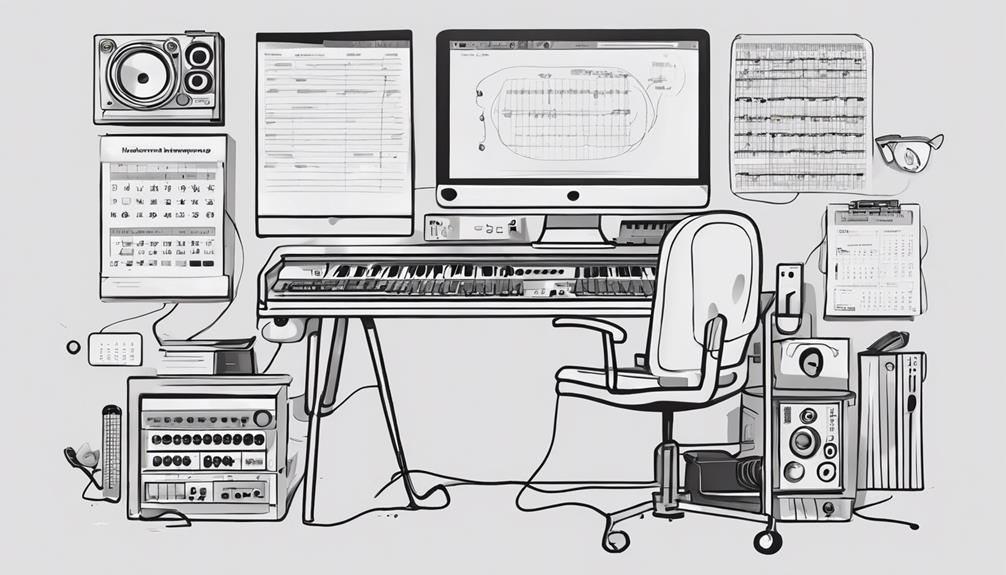
Consistent practice and a commitment to lifelong learning are fundamental for achieving continuous improvement in music production. As music producers, embracing the journey of skill development and focusing on cultivating a unique style through experimentation are key elements in your growth. It's essential to prioritize continuous improvement by regularly seeking feedback and constructive criticism to refine your production skills. Stay updated on new techniques, tools, and trends within the industry to enhance your abilities and keep your sound fresh and innovative.
| Continuous Improvement Tips | Description |
|---|---|
| Embrace Skill Development | Focus on honing your craft rather than comparing yourself. |
| Seek Feedback | Actively look for constructive criticism to refine your skills. |
| Stay Updated | Keep abreast of new techniques and trends to enhance your production. |
Follow Your Instinct
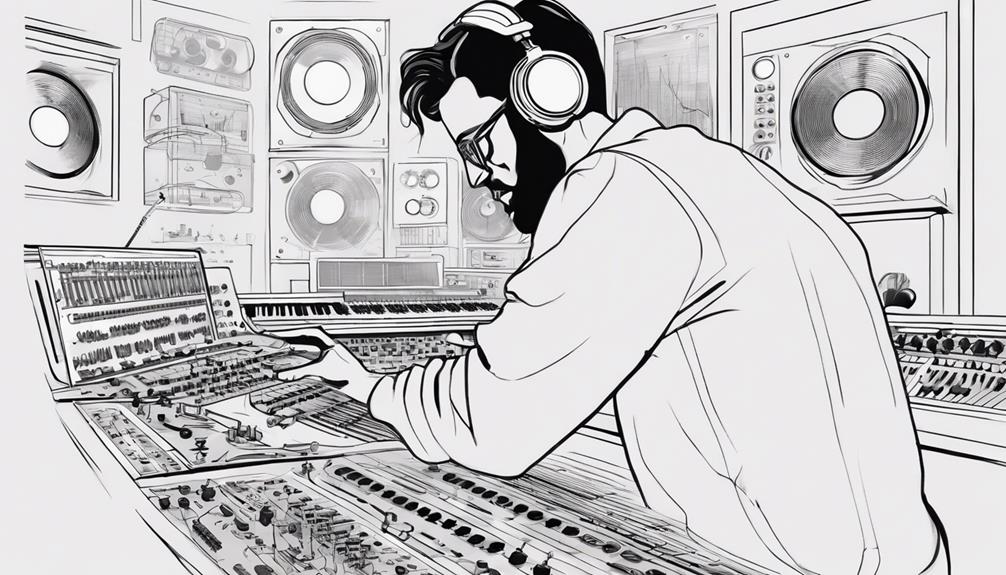
Trust your instincts is essential when making creative decisions in music production. Your instincts are like a compass guiding you towards unique and innovative production choices.
Here are some tips to help you follow your instincts effectively:
- Listen to Your Inner Voice: Pay attention to that gut feeling or sudden inspiration that nudges you towards a particular sound or arrangement. Your instincts often lead you to creative paths you mightn't have considered otherwise.
- Experiment Freely: Don't be afraid to take risks and try out new ideas that your instincts are urging you to explore. Being open to experimentation can lead to breakthrough moments in your music production.
- Trust Your Unique Perspective: Your instincts are shaped by your individual experiences and tastes. Embrace your distinct viewpoint, as it can help you craft a signature sound that sets you apart from others.
- Stay Authentic: Following your instincts can help you create music that feels authentic and true to yourself. Trusting your creative decisions based on intuition can lead to a more personalized and genuine musical expression.
Learn Music Theory
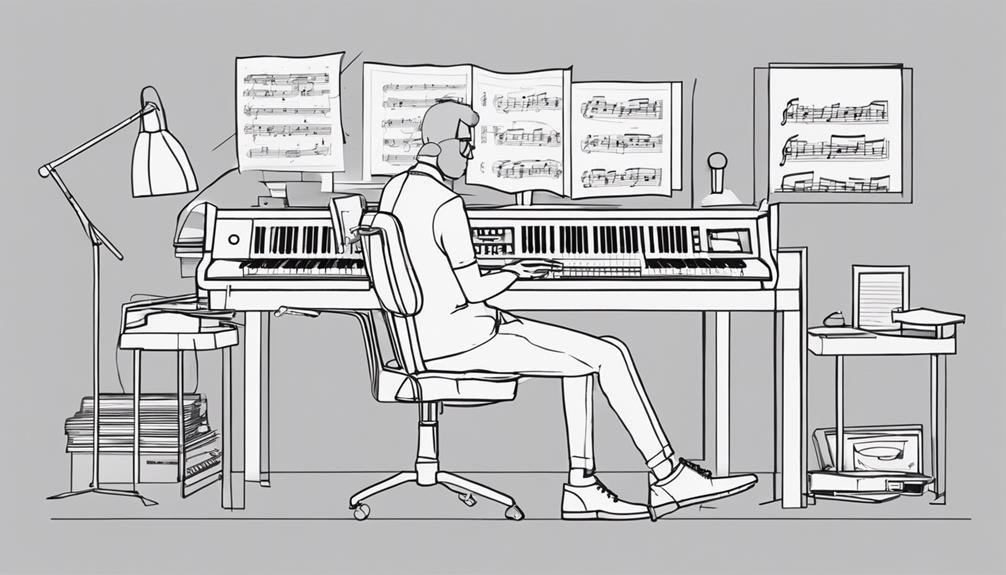
Understanding music theory is essential for enhancing your skills as a music producer and creating more engaging compositions. When you study music theory, you explore the foundational elements of music, such as scales and intervals. This knowledge not only helps you craft harmonious melodies but also allows you to construct enthralling chord progressions that form the backbone of your tracks.
By grasping the intricacies of music theory, you gain a deeper understanding of how to convey emotions through your musical ideas and structure your songs effectively.
Moreover, familiarity with music theory enables you to communicate your musical concepts with clarity and collaborate seamlessly with other musicians. It provides you with a common language to express your creative vision and experiment with different genres and styles in your music production journey.
Embrace the power of music theory to enhance your productions and open up a world of endless possibilities in your musical endeavors.
Build an Efficient Workflow
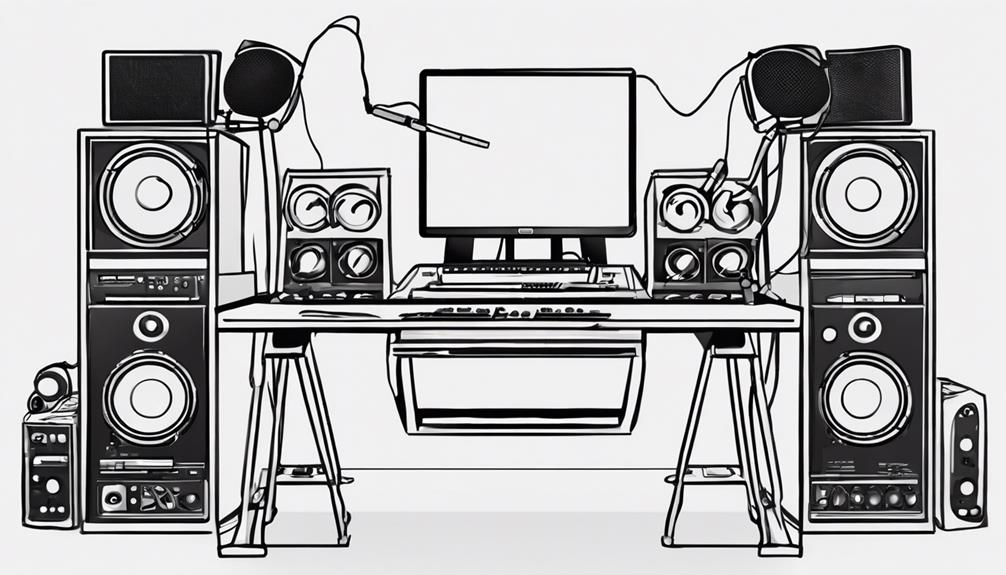
To improve your music production workflow, focus on creating custom DAW templates with pre-set effects and instruments for efficiency.
Organize your workspace and files to access tools and resources quickly during your sessions.
Utilizing MIDI controllers can also enhance control and speed up your production process.
Streamline Production Process
Efficiently building a streamlined production process is essential for music producers looking to optimize their workflow and productivity. To enhance your music production efficiency, consider the following tips:
- Organize Your Samples:
Keep your samples, presets, and project files neatly organized to save time searching for specific assets during your creative process.
- Create Custom Templates:
Develop custom templates in your DAW with your favorite plugins and settings. This will help you start new projects more efficiently and maintain consistency in your sound.
- Utilize Keyboard Shortcuts:
Take advantage of keyboard shortcuts and macros in your DAW to speed up tasks like editing, arranging, and mixing. This can significantly increase your workflow speed.
- Establish a Structured Routine:
Set up a structured routine for your music production sessions to stay focused and boost productivity. Having a consistent workflow can help you make the most out of your creative time.
Organize Project Files
Organizing your project files is essential for building an efficient workflow as a music producer. By implementing a consistent naming convention for tracks, stems, and versions, you can easily navigate and collaborate with others.
Grouping similar elements into folders or tracks helps streamline the production process, reducing clutter and saving time searching for specific components. Additionally, utilizing color-coding for tracks or sections enhances visual organization, making it easier to identify different parts of your project at a glance.
Remember to regularly back up your project files to prevent data loss and maintain continuity in your music production efforts. By incorporating these practices into your workflow, you can optimize your productivity and focus more on the creative aspects of music production.
Stay organized, stay efficient, and watch your music production skills soar to new heights.
Learn Sound Design
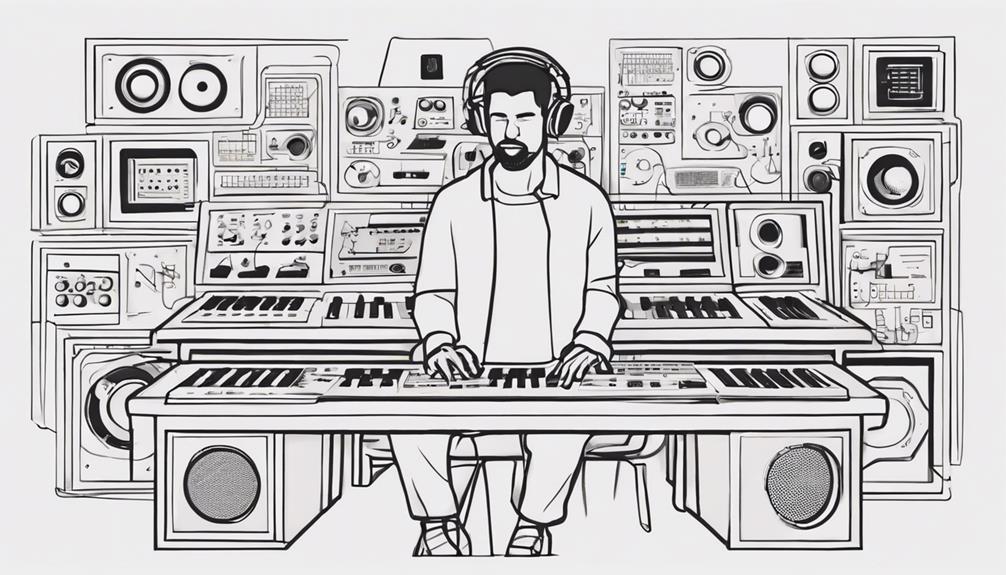
Enhancing your music production skills involves immersing yourself in the world of sound design, where audio elements are crafted and manipulated to create unique textures and timbres.
To excel in sound design, consider the following tips:
- Explore Synthesis Methods: Understanding techniques like subtractive, additive, FM, and wavetable synthesis can broaden your sound design palette and help you create diverse sonic textures.
- Experiment with Parameters: Engage in manipulating parameters such as oscillators, filters, envelopes, and LFOs to sculpt sounds that are rich in depth and character, allowing for greater creativity in your music production.
- Utilize Effects: Incorporating effects like reverb, delay, distortion, and modulation can add depth and dimension to your sounds, transforming them into unique and captivating elements within your tracks.
- Develop Your Sonic Identity: Learning sound design principles will enable you to develop a signature sound that sets you apart from others in the music industry, establishing your unique sonic identity and making your productions stand out.
Balance Variation and Repetition
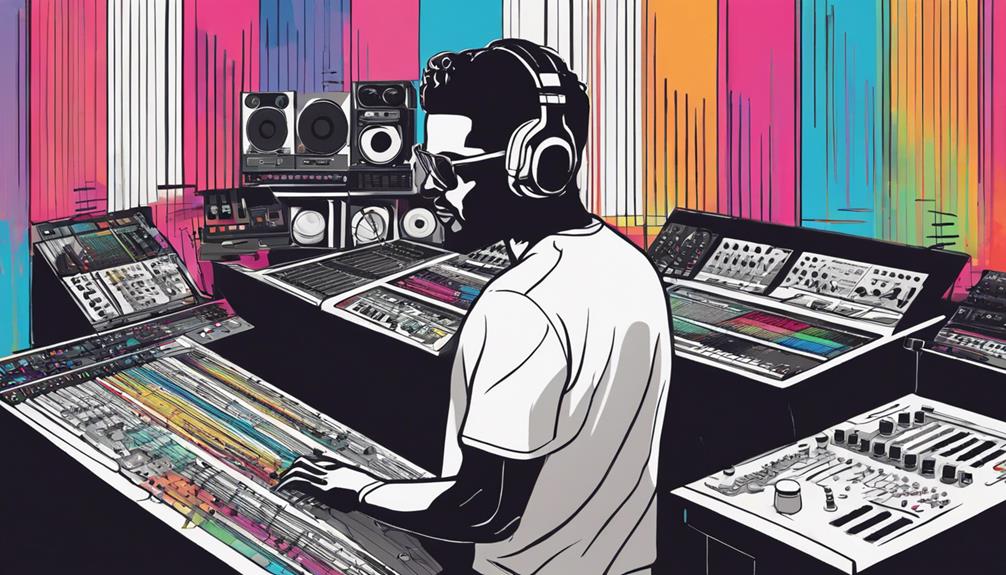
How can you effectively balance variation and repetition in your music production to create dynamic compositions?
In music production, finding the right mix of variation and repetition is essential for engaging your audience while maintaining cohesion in your tracks.
Variation adds interest by introducing new elements like melodies, rhythms, or textures. It keeps listeners engaged and prevents your music from becoming monotonous.
On the other hand, repetition helps reinforce key elements and establish familiarity within the song. Strategic use of repetition can create a sense of continuity and emphasize important parts of your composition.
Experiment with different ways to incorporate variation while using repetition to anchor your music. By striking a balance between these elements, you can craft dynamic and engaging music that captivates your audience from start to finish.
Frequently Asked Questions
How to Become a Very Good Music Producer?
To become a very good music producer, immerse yourself in music theory, practice diligently, seek feedback, explore various genres, and stay updated on industry trends. Your dedication and passion will catapult you to greatness.
How to Keep Improving as a Music Producer?
To keep improving as a music producer, you must stay dedicated to practicing consistently, learning from others, experimenting with new techniques, seeking feedback, and setting challenging goals. These efforts will help you grow and evolve. Additionally, exploring different genres and studying their unique characteristics can expand your creative horizons and inspire fresh ideas. Don’t hesitate to watch tutorials, read articles, or listen to podcasts that share valuable tips for improving music production, as staying informed can be a game-changer. Remember, persistence and an open mind are key to unlocking your full potential as a producer.
How Do You Get Good at Music Production?
Start by dedicating time to consistent practice. Experiment with various genres and tools to broaden your skills. Seek inspiration from others and focus on completing songs. Collaborate to gain new perspectives. Your journey in music production awaits.
What Do Music Producers Struggle With?
Struggling with creative blocks, technical challenges like mixing, and balancing creativity with skills are common for music producers. Managing time, seeking feedback, and overcoming self-doubt can be challenging but essential for growth in music production.
Conclusion
So, keep honing those skills, perfecting your craft, and never stop exploring new sounds.
Remember, like a conductor guiding a symphony, you have the power to create magic with each beat and melody.
Stay curious, stay inspired, and keep pushing the boundaries of what's possible in the world of music production.
The journey may be long, but the destination is worth every note.
Keep on creating and let your music soar!
Music Production
How to Charge for Music Production: Pricing Your Services!
Just starting out in music production? Learn how to set competitive rates and showcase your value to clients.
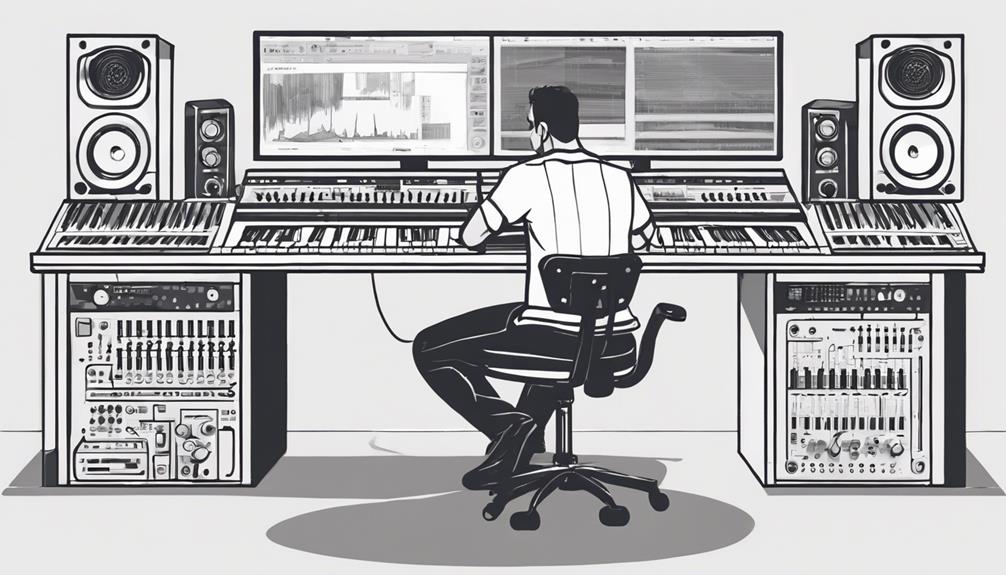
When pricing your music production services, consider your experience level, project type, market demand, location, and equipment quality. Assess your skills, unique value, and industry standards to set competitive rates. Highlight your expertise, professional background, and unique selling points. Build a diverse portfolio showcasing collaborations, testimonials, and recognition. Balance earning potential with experience, offering discounted rates and owning master recordings. Leverage top-of-the-line equipment for professional perception and improved sound quality. Master ownership benefits include licensing opportunities, royalties, and negotiating power. Communicate your value proposition through unique skills, project quality, and testimonials. Setting competitive prices aligned with industry standards is key.
Key Takeaways
- Consider experience level and expertise for pricing.
- Evaluate project type and market demand.
- Factor in location and top equipment quality.
- Assess unique skills and value proposition.
- Align rates with industry standards and project scope.
Factors Influencing Pricing Strategy
When determining your pricing strategy in music production, consider various factors that can have a substantial impact on how you set your rates. Your experience level plays a significant role in how much you can charge for your services. The more experienced you are, the more you can command higher rates due to the quality of work you provide.
Additionally, the type of project you're working on can also influence how much you charge. More complex or high-profile projects may warrant higher rates compared to smaller, simpler tasks.
To charge appropriately, you should also consider market demand and your location. In areas where there's a high demand for music production services, you may be able to charge more for your expertise. Moreover, having access to top-of-the-line equipment and resources can help you provide better services, allowing you to justify charging higher rates.
Assessing Your Experience and Skills
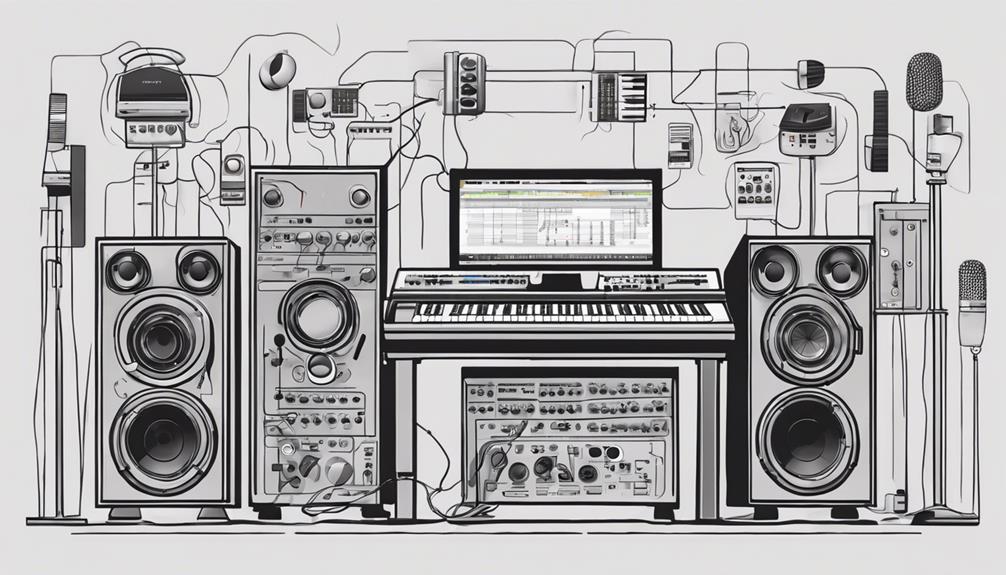
Assess how many years you've spent honing your music production skills to determine your expertise level.
Consider your professional background and any formal training you've received as key factors in setting your prices.
Identify the unique value you bring to clients through your experience and skills to establish a competitive pricing strategy.
Skill Level Evaluation
Consider evaluating your experience and skills in music production to determine your proficiency level. To accurately evaluate your skill level, reflect on factors like the number of years you've been involved in music production, any formal training you've received, and the successful projects you've worked on. Additionally, assess your technical abilities, creativity, and familiarity with music production software and equipment.
Identifying your unique selling points, such as expertise in specific genres or instruments, can also help determine your skill level. It's essential to compare your skill level to industry standards and competitors to gauge where you stand in the music production market.
Remember that continuous improvement is key to enhancing your skills. Stay updated on industry trends, engage in training opportunities, and practice regularly to refine your abilities. By consistently seeking ways to improve, you can strengthen your skill set and refine your pricing strategy in music production.
Experience Assessment
Evaluate your music production experience by reflecting on the number of years you have actively engaged in the field and the diverse projects you have successfully completed.
Consider the skills you have acquired through training, education, and professional development.
Assess the complexity and variety of projects you have handled to gauge your level of expertise.
Think about any specialized knowledge or unique abilities you possess that set you apart in the music production industry.
Compare your experience level to industry standards to determine a significant pricing structure when you charge for your services.
By conducting a thorough experience assessment, you can confidently showcase your capabilities and set competitive rates that reflect the value you bring to each project.
Value Proposition Identification
Identify the unique blend of experience and skills you bring to the table in music production to establish your value proposition. Assess your education, training, and industry tenure to gauge your expertise level.
Consider your distinctive skills, specialties, and past achievements to pinpoint your competitive edge. Evaluate how your experience and skills enhance the quality and value of your music production services.
By understanding your value proposition, you can make better services tailored to your clients' needs and preferences. Your value proposition should be the foundation for setting prices that reflect the expertise and excellence you offer.
Ultimately, your ability to articulate and demonstrate the value you bring to the table won't only attract clients but also justify the charges based on the quality and uniqueness of your music production services.
Understanding Overhead Costs
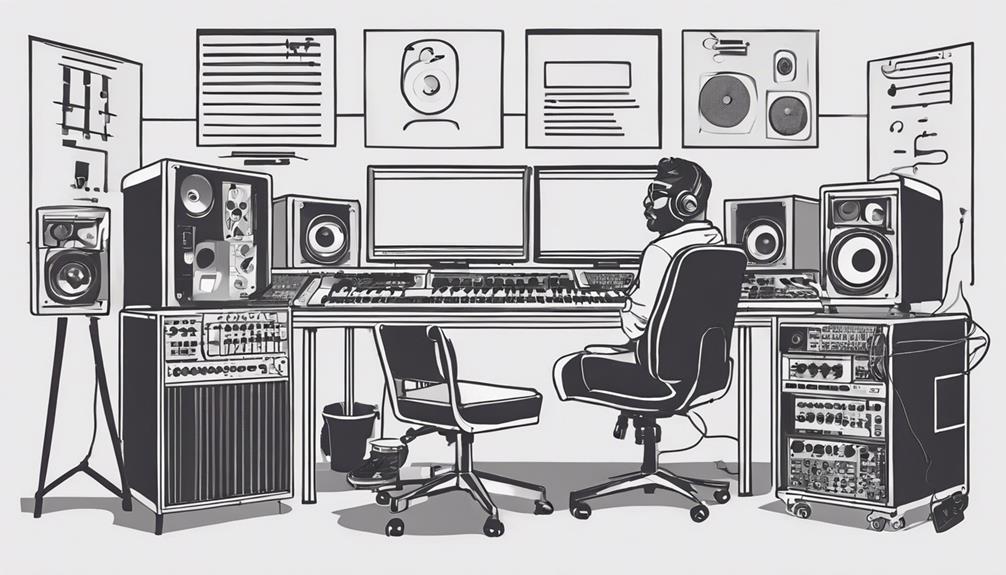
When running a music production business, you need to comprehend your overhead costs to guarantee profitability.
Calculate studio expenses, factor in equipment costs, and manage ongoing expenditures diligently.
Calculating Studio Expenses
Consider incorporating studio rent, equipment upkeep, and insurance expenses into your pricing calculations to understand overhead costs effectively. These overhead costs are vital components of your pricing structure and play a significant role in determining how much to charge for your music production services.
In addition to these essential expenses, don't forget to factor in other costs such as gas, travel time, vehicle maintenance, credit card fees, business expenses, and financial splits for online services. By including all these elements in your pricing strategy, you can guarantee that your prices accurately reflect the true cost of running your music production studio.
Understanding how overhead costs impact your profitability is key to setting prices that align with your business goals. Being transparent with your clients about all costs, including overhead expenses, fosters trust and helps build long-lasting relationships.
Adjust your pricing strategies as needed to maintain a healthy balance between covering your expenses and generating a sustainable income.
Factoring Equipment Costs
Include equipment costs in your pricing strategy to effectively cover studio rent, insurance, and maintenance expenses while understanding overhead costs in your music production business.
To make better pricing decisions, factor in not only the initial purchase cost of your equipment but also ongoing expenses like repairs, upgrades, and replacements. By incorporating these costs into your rates, you guarantee that you're adequately compensated for the tools essential to your work.
Moreover, understanding your overhead costs goes beyond just equipment. Consider additional expenses such as gas, travel time, and vehicle maintenance, as well as financial splits for online services and credit card fees.
Being mindful of these factors allows you to set rates that reflect the true cost of doing business in the music production industry.
Managing Ongoing Expenditures
Managing ongoing expenditures in music production involves understanding the various overhead costs associated with running your business efficiently. Overhead costs encompass expenses like studio rent, equipment upkeep, insurance, gas, travel time, vehicle expenses for on-site work, financial splits for online services, and credit card fees.
These costs directly impact the profitability of your music production services and should be carefully managed to guarantee sustainability. By comprehending and monitoring your overhead costs, you can make informed decisions when setting competitive pricing for your services.
It's imperative to factor in all these expenses to guarantee that your pricing structure not only covers your production costs but also allows you to generate a profit. Being aware of your overhead costs and incorporating them into your pricing strategy will help you establish a sustainable and successful business in the music production industry.
Researching Market Rates
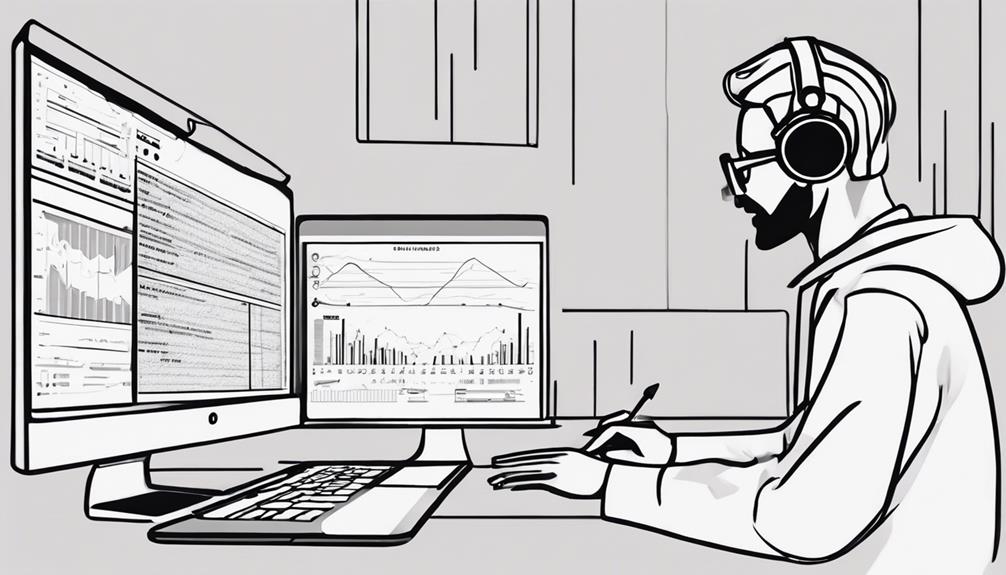
To set competitive prices for your music production services, start by researching local market rates. Understanding the prevailing market rates will give you valuable insights into industry standards and pricing benchmarks.
Analyze competitor rates to assess the market demand and competitive landscape effectively. Factors such as your experience level, location, and the type of project will also play a significant role in determining your pricing strategy.
Delve into online resources, forums, and industry events to gather further insights on music production pricing trends. It's important to stay updated on industry developments and fluctuations to adjust your pricing strategy accordingly.
Building a Strong Portfolio
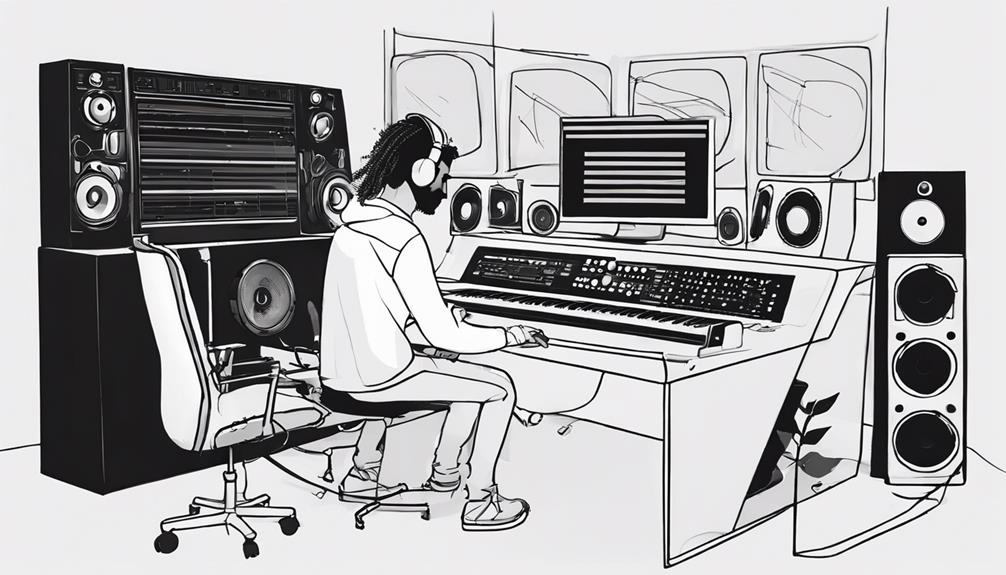
When showcasing your music production skills, a strong portfolio is essential to demonstrate your expertise and versatility. To build a compelling portfolio, consider the following tips:
- Showcase Variety: Include a diverse range of projects in your portfolio to highlight your versatility and experience.
- Highlight Collaborations: Feature successful collaborations with artists, producers, and other industry professionals to showcase your teamwork skills.
- Include Testimonials: Incorporate client testimonials in your portfolio to provide social proof of your capabilities and professionalism.
- Update Regularly: Keep your portfolio fresh by adding new projects and achievements to demonstrate growth and relevance in the industry.
- Emphasize Recognition: Highlight any industry awards, nominations, or recognitions you have received to boost credibility and showcase your expertise.
Balancing Earning and Experience
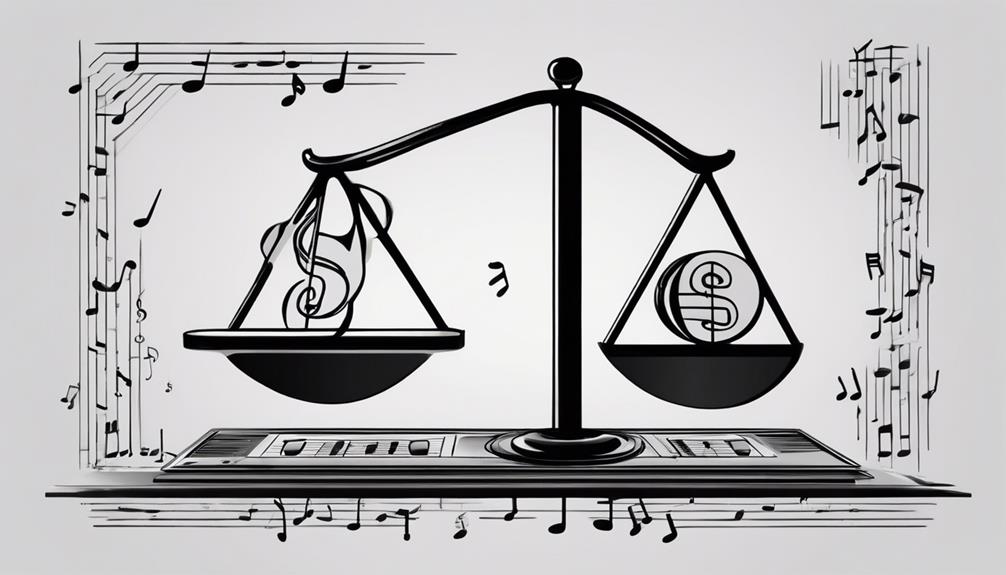
To achieve a successful balance between earning revenue and gaining valuable experience in music production, it's essential to set competitive rates aligned with your skills and the market demand.
When deciding how much to charge, consider working for friends or offering discounted rates initially to make money while honing your craft. The amount you can charge often depends on the client and the project's scope.
Owning the master recordings can also provide long-term benefits for your career and future earnings potential. Setting rates based on industry standards, personal equipment quality, and your level of experience can help you establish fair pricing that reflects both your worth and the value you bring to the table.
Leveraging Equipment Quality
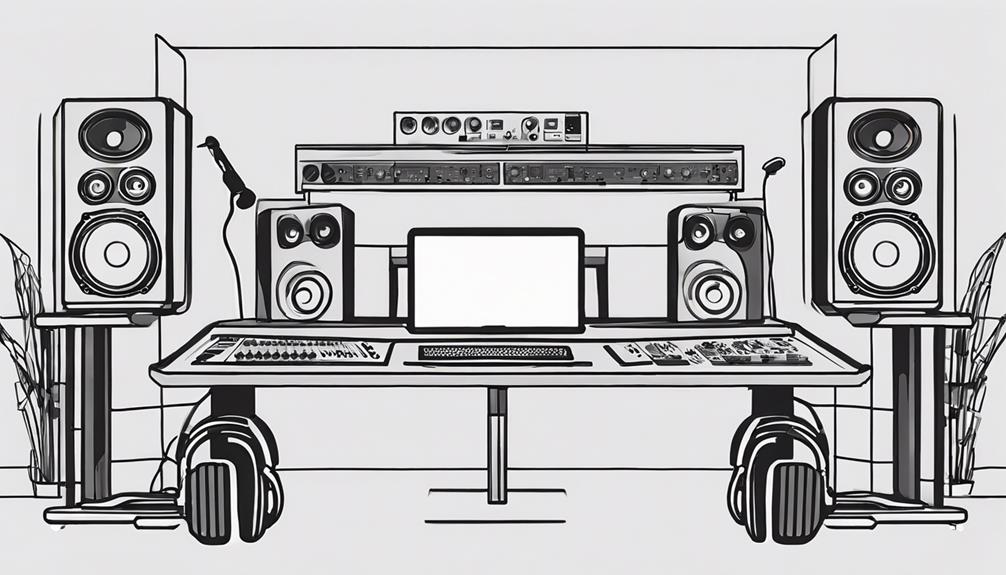
Leveraging high-quality equipment enhances your credibility and justifies higher pricing in music production services. When you invest in quality gear, you elevate your offerings and set yourself apart from the competition.
Here are five key points to ponder when leveraging equipment quality in your music production services:
- Professional Perception: Clients often associate high-quality equipment with professional-grade services, making them more willing to pay premium prices.
- Differentiation: High-quality gear helps differentiate your services, showcasing your commitment to excellence and attracting clients seeking superior quality.
- Improved Sound: Upgrading your equipment can lead to better sound quality, enhancing the final product and increasing client satisfaction.
- Value Communication: Communicating the value of premium equipment to your clients can justify charging higher rates and emphasize the quality of your services.
- Elevated Credibility: Having quality gear not only boosts your credibility in the industry but also allows you to command higher rates for your expertise and equipment quality.
Master Ownership Benefits

When you own the master recordings, you hold the reins on how your music is shared and licensed. This ownership opens up opportunities for revenue through royalties and licensing agreements.
Having master ownership also gives you a strong position in negotiations with artists and labels.
Ownership Rights Explained
Having ownership of the master rights in music production provides you with control over the final product and opens up potential revenue streams. When you retain master ownership, you're in a powerful position to maximize the benefits of your work.
Here are some key points to keep in mind:
- Licensing Opportunities: With master ownership, you can license your music for various uses, such as films, commercials, and video games.
- Royalty Collection: Retaining rights allows you to collect royalties whenever your music is played or sold.
- Financial Benefits: Keeping master ownership can lead to long-term financial gains as your music continues to generate income.
- Creative Control: You have the freedom to make creative decisions about your work without external influences.
- Negotiating Power: Holding onto master ownership gives you leverage to negotiate higher fees and better terms for your services.
Value of Master Ownership
Moreover, owning the master in music production offers significant advantages, providing producers with control over how their work is utilized and the potential for various revenue streams. By retaining master ownership, you have the power to dictate how your music is shared and distributed.
This control extends to negotiating licensing deals and earning royalties, giving you the opportunity for long-term passive income. Additionally, holding onto master ownership allows you to maintain creative control and safeguard your artistic vision.
You can leverage this ownership to re-release and monetize your music in the future, opening up additional income avenues. Through master ownership, you not only protect your work but also position yourself to capitalize on its value over time.
Embracing master ownership empowers you to shape the trajectory of your music career and maximize the financial returns on your creative endeavors.
Communicating Value Proposition
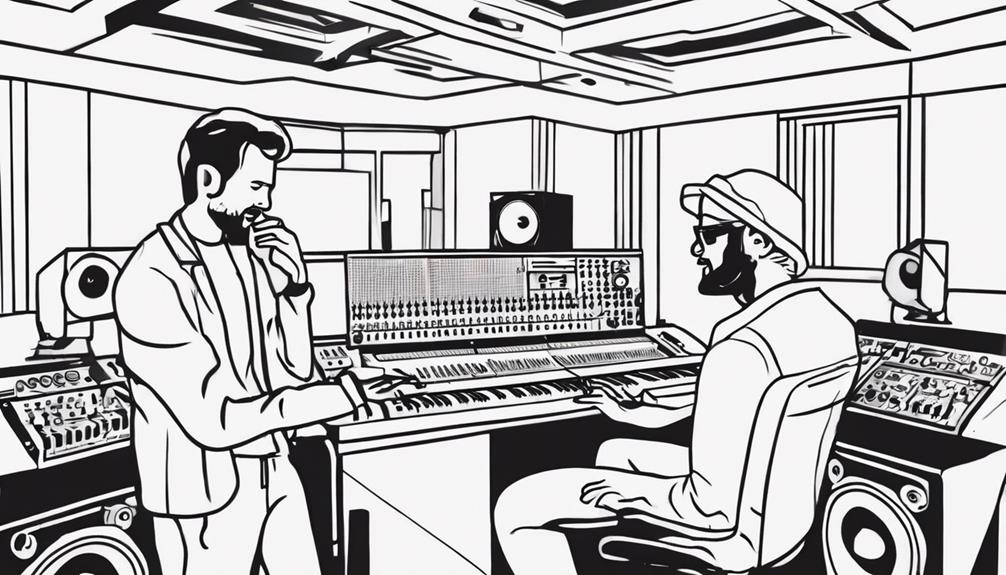
To effectively convey the worth of your music production services, clearly outline the specific benefits and advantages clients will gain from working with you.
- Highlight Your Unique Skills: Showcase your specialized skills, experience, and high-quality equipment that set you apart in the industry.
- Enhance Project Quality: Demonstrate how your services can elevate the quality and success of the client's music project.
- Provide Testimonials: Use testimonials, case studies, or examples of past successful projects to prove the value you bring to the table.
- Show Transparency: Be transparent in your pricing structure to build trust and showcase the worth of your services.
- Demonstrate Results: Illustrate how your music production services have delivered tangible results for your clients, emphasizing the benefits they've experienced.
Setting Competitive Prices

Consider researching competitor rates in your area to establish competitive prices for your music production services. By understanding what others are charging, you can position your pricing strategy effectively. Take into account factors like your experience level, equipment quality, and client demand when determining your rates. It's crucial to adjust your prices based on the project's complexity and duration to guarantee fair compensation for your work.
To attract and retain customers, consider offering package deals, discounts for repeat clients, or even royalties for revenue sharing. These incentives can make your services more appealing in a competitive market.
Additionally, staying updated on industry trends and networking opportunities can help you enhance your value proposition and refine your pricing strategy to stay competitive.
Setting competitive prices is vital to showcasing your worth while also appealing to potential clients. By staying informed and flexible with your pricing, you can position yourself effectively in the music production industry.
Frequently Asked Questions
How to Price Music Production Services?
When pricing music production services, consider hourly rates and flat project rates based on experience and project complexity. Negotiate royalties for ongoing projects, offer package deals, and provide discounts for repeat clients to foster long-term relationships and loyalty.
What to Charge as a Music Producer?
As a music producer, your rates should harmonize with your expertise, project intricacy, and market demand. Tailor hourly rates between $30 to $200, while considering flat project fees. Mix in royalties for a sweet sound.
How Much Percentage Should a Producer Get?
When determining how much percentage you should get as a producer, consider factors like your experience, involvement in the project, and industry standard rates. Negotiate for a percentage that reflects your contributions.
How Much Do Producers Charge per Beat?
Feeling the rhythm in your bones? Producers charge anywhere from $20 to thousands per beat. Prices vary based on experience, demand, and exclusive rights. Lease options and bulk discounts are common strategies to attract clients.
Conclusion
To sum up, here are the key steps to confidently set competitive prices for your music production services:
- Evaluating your skills
- Understanding costs
- Researching rates
- Building a portfolio
- Communicating value
Remember, quality work deserves fair compensation, so don't undersell yourself. Stay true to your worth and clients will see the value in what you offer.
Good luck on your pricing journey!
Music Production
How to Build a Music Production PC: Ultimate Guide!
Navigate the intricate world of music production PC building with expert tips and tricks that will elevate your sound to new heights.
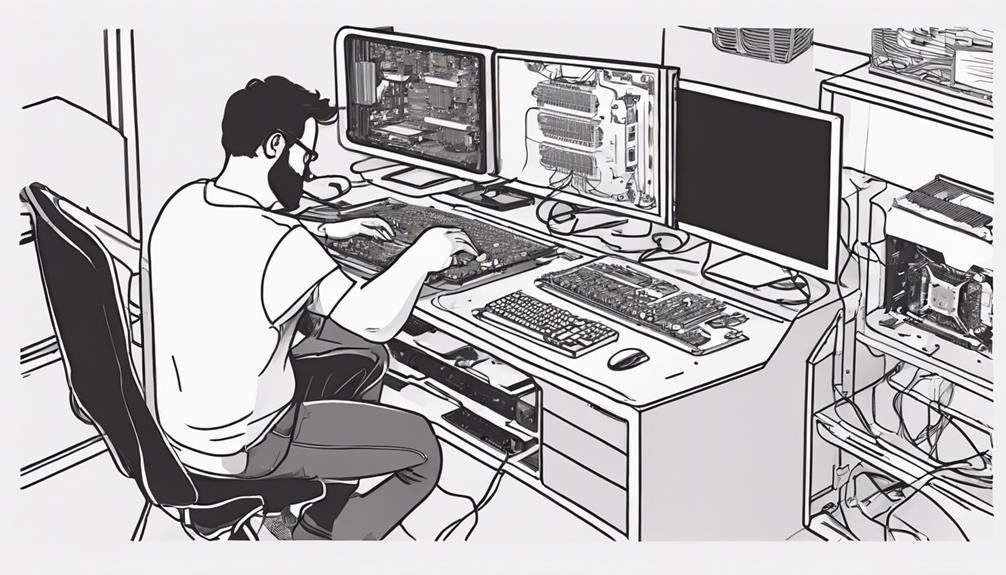
To build the ultimate music production PC, prioritize a powerful CPU with 6+ cores and at least 16GB RAM. Opt for speedy NVMe SSDs and a versatile motherboard. Invest in high-quality sound cards or audio interfaces for quality. For software, get Ableton Live and plugins for creativity. Build smartly by selecting compatible hardware, connecting peripherals, and ensuring cooling. Maintain and upgrade with care. Consider AI integration for innovative music creation. Crafting a music production PC is crucial for smooth workflow and audio power, setting the stage for your creative journey.
Key Takeaways
- Choose a CPU with 6+ cores and high clock speeds for optimal performance.
- Opt for 16GB+ high-speed RAM for smooth multitasking.
- Consider NVMe or SATA SSDs for fast data access.
- Select a motherboard with ample connectivity and RAM slots.
- Invest in a quality sound card or external audio interface for precise audio quality.
PC Hardware Selection
For a solid music production PC, prioritize selecting the right hardware components to guarantee peak performance. When delving into the world of music production, your PC's CPU plays an essential role. Opt for a powerful CPU with at least 6 cores and high clock speeds to ensure smooth audio processing.
To handle large audio files and multiple plugins simultaneously, aim for a minimum of 16GB of high-speed RAM. Consider SSD storage options like NVMe or SATA for faster data access and improved overall performance.
When selecting a motherboard for your music production PC, focus on ample connectivity options. Look for a motherboard with multiple RAM slots and high-speed M.2 slots to accommodate your needs. Additionally, ensure you have a quality sound card or external audio interface to provide precise audio input and output capabilities for your music projects.
Essential Components for Audio Production
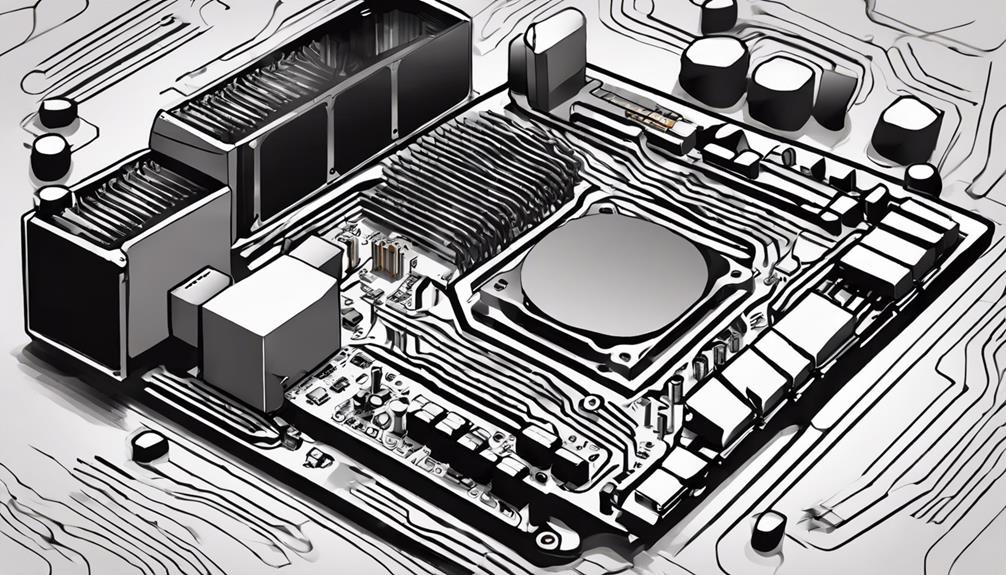
You need to make sure your music production PC has a powerful CPU with at least 6 cores to handle audio tasks efficiently.
RAM is essential, starting with 16GB for smooth multitasking.
Consider fast storage solutions like NVMe SSDs to enhance performance.
Key Hardware Components
When assembling a music production PC, essential components for audio production include a powerful CPU with at least 6 cores for efficient processing of audio tasks. Alongside a robust CPU, having a minimum of 16GB RAM ensures smooth performance when handling multiple audio tracks and plugins. Opting for storage solutions such as NVMe SSDs or SATA SSDs aids in quick data access and loading times for audio files. While GPUs are not heavily utilized in audio operations, investing in a quality sound card is crucial for maintaining precise audio quality. External DACs, amplifiers, USB audio interfaces, XLR microphones, as well as high-quality headphones or speakers, are specialized components that elevate the audio production experience.
| Component | Description |
|---|---|
| CPU cores | A powerful CPU with at least 6 cores is essential for efficient audio processing. |
| RAM | Starting with 16GB RAM ensures smooth performance handling multiple audio tracks. |
| Storage | NVMe SSDs or SATA SSDs are ideal for fast data access and quick loading of audio files. |
Software Requirements
Utilize digital audio workstation (DAW) software to lay the foundation for your music production setup. DAW software such as Ableton Live, Pro Tools, or FL Studio serves as the central hub for recording, editing, and mixing your music.
To enhance creativity and sound quality, incorporate audio plugins and virtual instruments into your setup. These tools offer a wide range of effects, instruments, and sounds to elevate your productions.
Invest in high-quality audio interfaces and sound cards to guarantee excellent recording and playback capabilities. These components are essential for capturing and reproducing audio with clarity and precision.
Additionally, MIDI controllers and external gear play an essential role in controlling and manipulating sounds within your DAW, providing tactile control over various parameters.
Stay up to date with software updates to access the latest features, improvements, and ensure compatibility with your music production software. Regular updates help optimize performance and streamline workflow, enhancing your overall music production experience.
Building the PC Step-by-Step
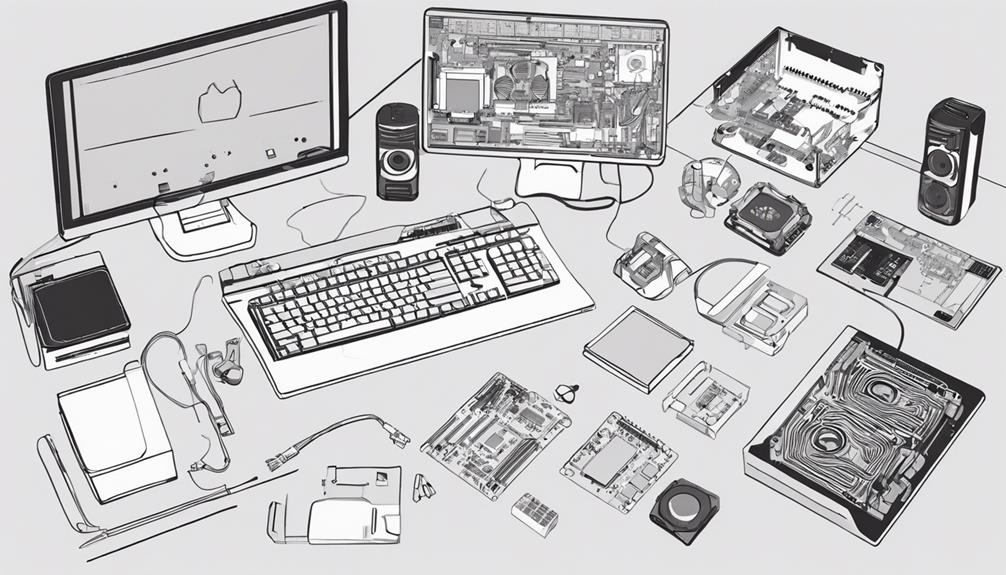
Begin the process of building your music production PC by carefully selecting a compatible motherboard and CPU that meet your specific production requirements.
Once you have the motherboard and CPU, proceed by installing the CPU, RAM, and storage devices like SSDs or HDDs onto the motherboard.
Next, connect external peripherals such as sound cards, DACs, and USB interfaces to enhance audio quality during your music production sessions.
It's vital to guarantee proper cooling for your system, whether through fans or liquid cooling systems, to prevent overheating when working intensively on music projects.
After setting up the internal components, double-check all connections to ensure everything is correctly linked.
Then, power up the PC and proceed with installing the necessary software for your music production needs. This step is essential to transform your hardware setup into a fully functional music production workstation.
Software Setup for Music Production
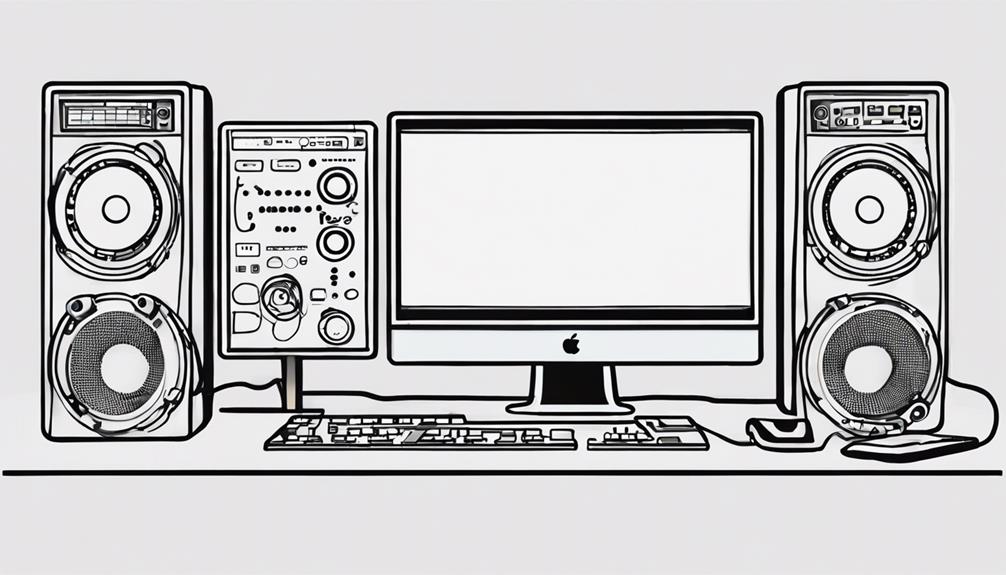
Consider adding a Digital Audio Workstation (DAW) like Ableton Live or Pro Tools to your software arsenal for music production.
To optimize your setup, incorporate plugins and virtual instruments for enhanced capabilities.
Configure your audio interface and adjust audio settings in both the operating system and DAW to guarantee seamless integration.
Enhance your creative control by connecting and setting up MIDI controllers and external gear.
Stay proactive by regularly checking for software updates for your DAW, plugins, and drivers to maintain peak performance.
Maintenance and Upgrades
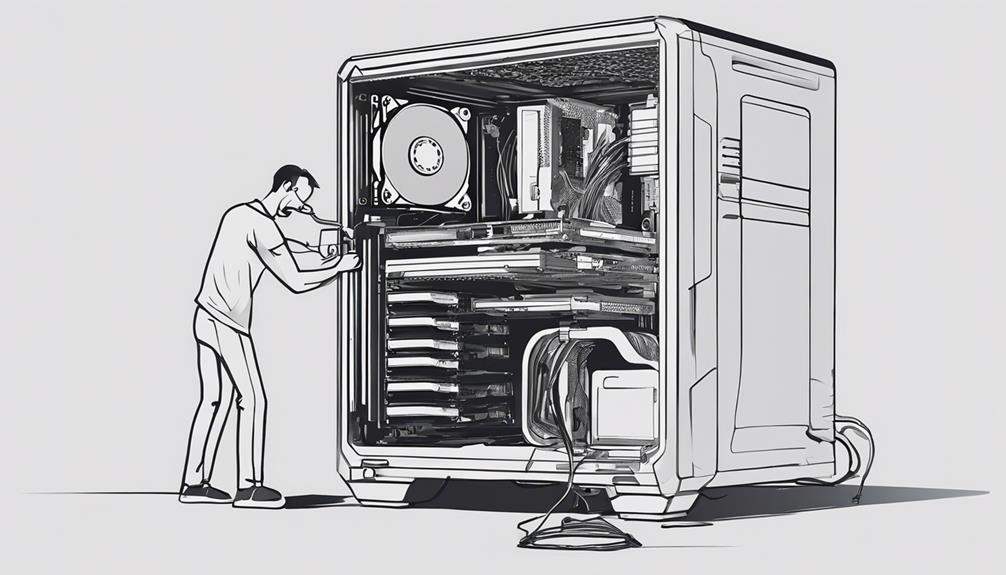
To keep your music production PC running smoothly, remember to stick to a regular cleaning schedule and check component compatibility before upgrading.
Regular maintenance will help prevent issues like dust buildup or overheating, while ensuring compatibility will avoid any potential hardware or software conflicts.
Regular Cleaning Schedule
Regularly cleaning your music production PC is crucial to prevent dust buildup and maintain peak performance. Dust accumulation can impede airflow, leading to reduced cooling efficiency, overheating, and potentially causing hardware failures.
To guarantee the longevity of your custom-built PC, consider setting a cleaning schedule every 3-6 months.
Here are some tips for maintaining your music production PC:
- Use compressed air: Clean fans, vents, and components to improve airflow.
- Prevent overheating: Regular cleaning can help avert overheating issues.
- Enhance cooling efficiency: Removing dust allows for better cooling of internal components.
- Avoid hardware failures: Proper maintenance can avert unexpected hardware malfunctions.
- Prolong longevity: Cleaning your PC regularly can extend the lifespan of your components.
Component Compatibility Checks
Maintaining peak performance for your music production PC also involves ensuring compatibility when conducting component upgrades and maintenance checks.
When upgrading components such as audio cards or processors, it's essential to check motherboard compatibility by verifying the socket type and chipset align with the new component. Additionally, confirm that your power supply unit (PSU) can handle the wattage requirements of the new component to prevent power issues.
Consider the cooling requirements of the upgraded part to avoid overheating and maintain peak performance. Ensure the new component fits in your PC case with enough clearance for proper installation to avoid any physical constraints.
Double-check the BIOS and drivers to guarantee they're up to date and compatible with the new component, facilitating seamless integration into your system.
Choosing the Right Software
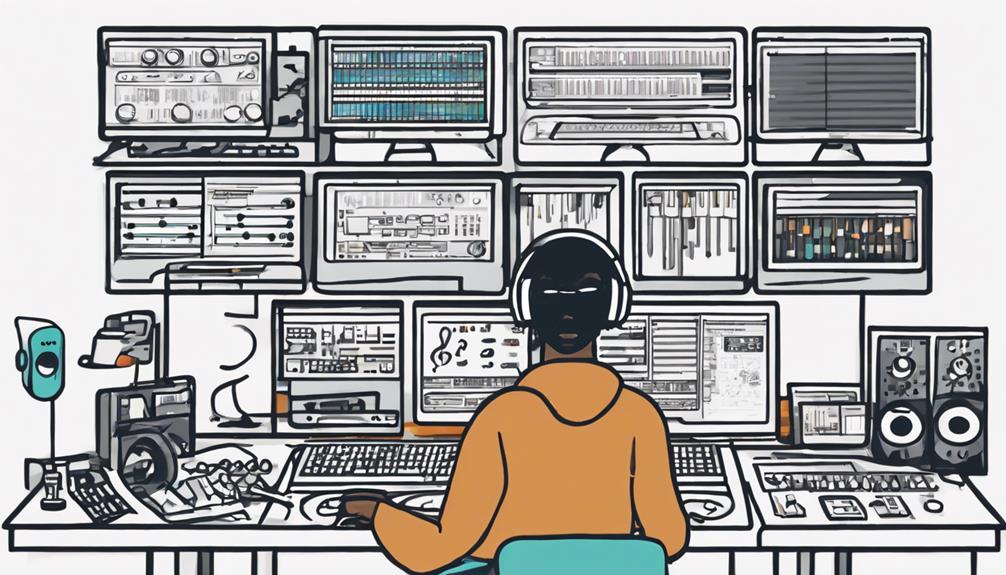
When selecting software for your music production PC, prioritize a Digital Audio Workstation (DAW) that aligns with your creative process and preferences. Consider options like Ableton Live, FL Studio, Pro Tools, or Logic Pro X.
Here are some key factors to keep in mind:
- Look for software that supports a wide range of plugins and virtual instruments to enhance your creativity and sound variety.
- Confirm the software is compatible with your operating system (Windows, macOS, Linux) to guarantee smooth performance.
- Explore tools within the software such as automation, mixing capabilities, mastering features, and audio editing functions to streamline your music production workflow.
- Stay updated on software updates and new releases to access the latest features, improvements, and bug fixes for peak performance.
AI Integration in Music Production
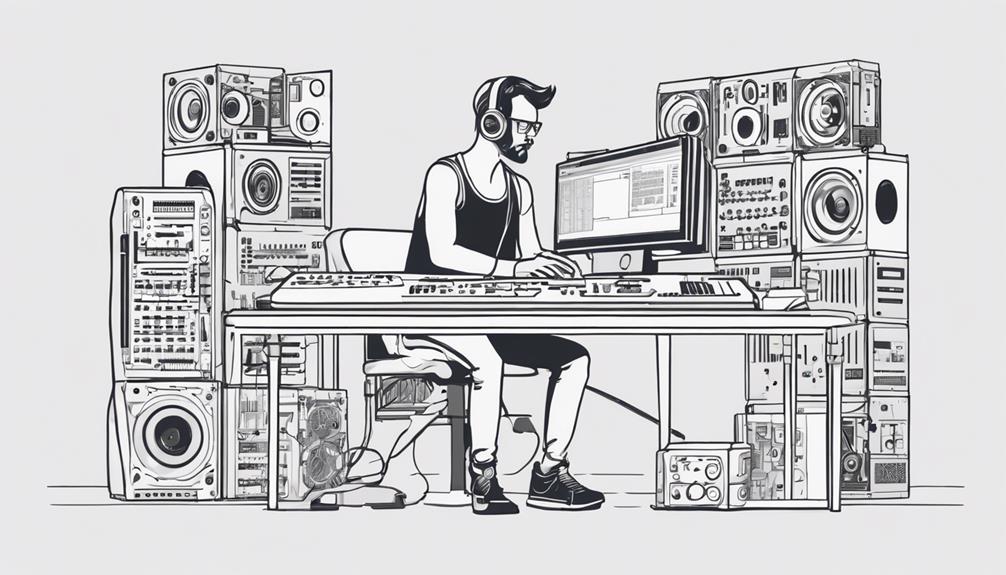
To further enhance your music production capabilities, consider integrating AI technology into your workflow for innovative creations and expanded creative possibilities.
AI in music production goes beyond just generating new music; it can invent entirely new genres by combining different styles. Additionally, AI tools like Magenta by Google enable artists to create groundbreaking compositions that push the boundaries of traditional music.
Not only does AI streamline your workflow, but it also enhances creativity by offering new possibilities for experimentation.
Moreover, AI can assist in creating robotic actors with specific emotional characteristics tailored for music production, opening up a domain of unique possibilities for storytelling through music.
Frequently Asked Questions
What PC Specs Do You Need for Music Production?
To excel in music production, make sure your PC boasts a CPU with at least 6 cores, 16GB of RAM, NVMe SSDs for speed, and quality peripherals. While GPUs aren't essential, a mid-range option can aid visual tasks.
How to Configure PC for Music Production?
To configure your PC for music production, optimize CPU with at least 6 cores for multitasking. Prioritize 16GB RAM for smooth operation. Choose NVMe SSD for faster data access. Install a sound card for high-quality audio. Guarantee proper cooling to prevent overheating.
Do You Need a High End PC for Music Production?
You don't necessarily need a high-end PC for music production, but it greatly enhances processing speed, multitasking abilities, smoother audio editing, and future-proofing for advanced software. Consider more RAM, storage options, and GPUs for peak performance.
What PC Do Music Producers Use?
Music producers use custom-built PCs tailored to their needs. These PCs have high-performance CPUs, ample RAM, fast storage, and quality audio interfaces. Choosing components that prioritize power, multitasking, and audio quality impacts production efficiency and speed.
Conclusion
To sum up, constructing your own music production PC can be a fulfilling experience. Did you know that 80% of professional music producers use custom-built PCs for their work?
By selecting the appropriate hardware and software, you can create high-quality music and tap into your creativity.
So, roll up your sleeves, follow our guide, and start making music like a pro!
Music Production
How to Get Good at Music Production: Master Your Craft!
Obsessed with perfecting your music?
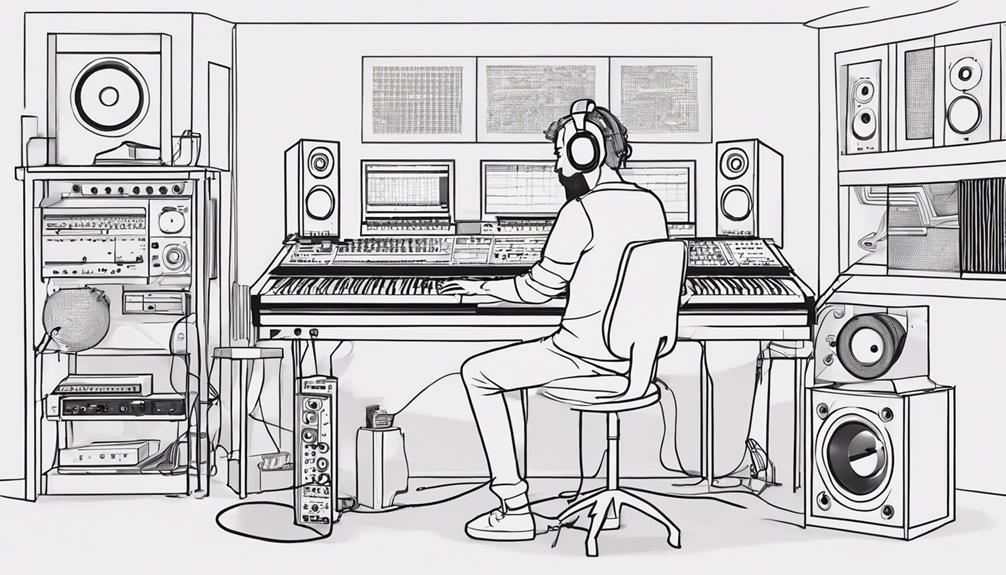
To master music production, dive deep into your DAW, experiment with new sounds, and practice regularly. Explore recording techniques like microphone placement and post-editing. Refine your skills daily, try different software, and embrace diverse music genres. Share your unique style by blending influences and collaborating with others to evolve creatively. Mastering your craft is a journey of continuous learning and growth.
Key Takeaways
- Master your DAW by exploring tools and effects for sound design.
- Embrace regular practice and experimentation to refine skills.
- Focus on recording techniques like microphone placement and gain staging.
- Share your unique style by blending influences and seeking feedback.
- Collaborate with other producers for fresh insights and growth opportunities.
Dive Into Your DAW
Ready to immerse yourself in your Digital Audio Workstation (DAW) to level up your music production skills? Your DAW is the heart of your music production setup, offering a powerful platform to amplify your creativity.
Whether you're using Ableton Live, FL Studio, Logic Pro, or Pro Tools, mastering your DAW is key to producing high-quality tracks across different genres.
By delving into your DAW, you can discover a plethora of tools, effects, and features that can enhance your sound design and music production capabilities. Take advantage of online courses, tutorials, and resources to improve your understanding of your DAW's functionalities.
Through practice sessions, you'll uncover tips and tricks that streamline your workflow and boost your creativity.
Experiment with different plugins, virtual instruments, and mixing techniques within your DAW to craft unique sounds and textures. As you spend more time producing music, you'll find that you've learned a lot and honed your skills in utilizing studio monitors or speakers to achieve professional-grade audio output.
Embrace the versatility of your DAW to maximize your full potential in music production.
Embrace Experimentation and Practice
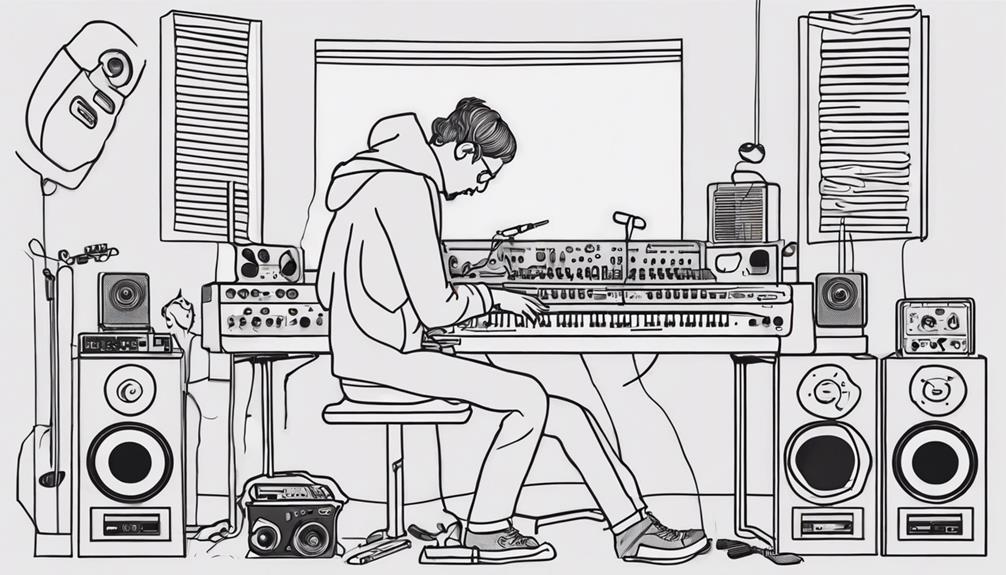
To excel in music production, immerse yourself in experimentation and regular practice sessions. Experiment with various genres, sounds, and techniques to uncover your unique style in music production.
Regular practice is key to honing specific skills like mixing, mastering, and sound design, enhancing your overall production quality. Embrace failure as a stepping stone for growth, providing opportunities for experimentation and learning in your music production journey.
Set achievable goals for each practice session to monitor progress and keep yourself motivated in mastering your craft. Additionally, collaborating with other producers and musicians can offer fresh perspectives, insights, and techniques to elevate your music production skills.
Explore Recording Techniques
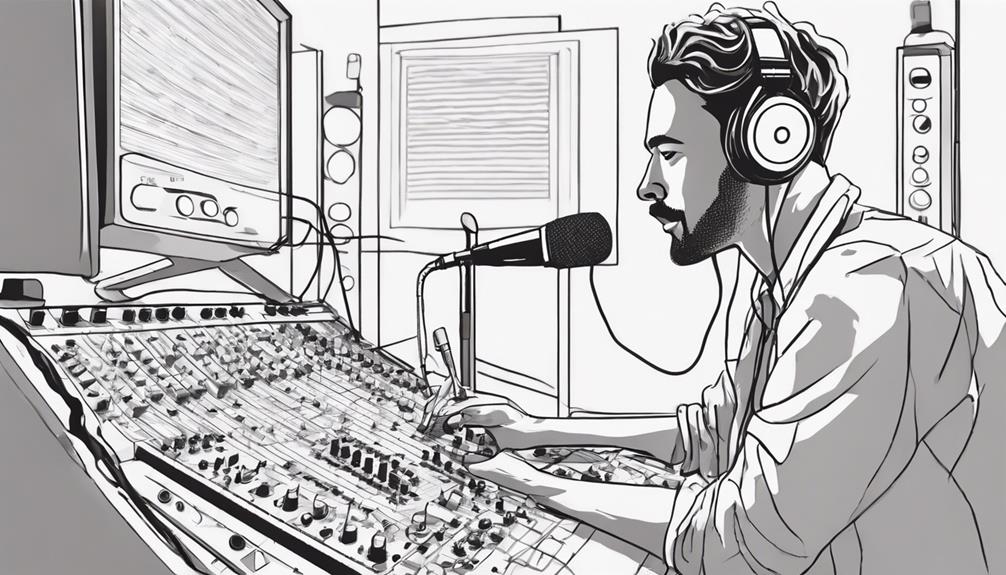
Exploring recording techniques in music production involves mastering the art of capturing high-quality audio through precise input selection, level adjustments, and signal cleanliness. To excel in this aspect, focus on proper microphone placement, gain staging, and understanding room acoustics to guarantee superior recording quality while minimizing unwanted noise interference.
Experimenting with various microphone types such as condenser, dynamic, and ribbon microphones can greatly impact the way vocals, instruments, and other sound sources are captured during recording sessions. Additionally, familiarize yourself with post-recording editing techniques like comping, editing, and time-aligning to refine and enhance the overall quality and coherence of your recorded tracks.
Refine Music Production Skills
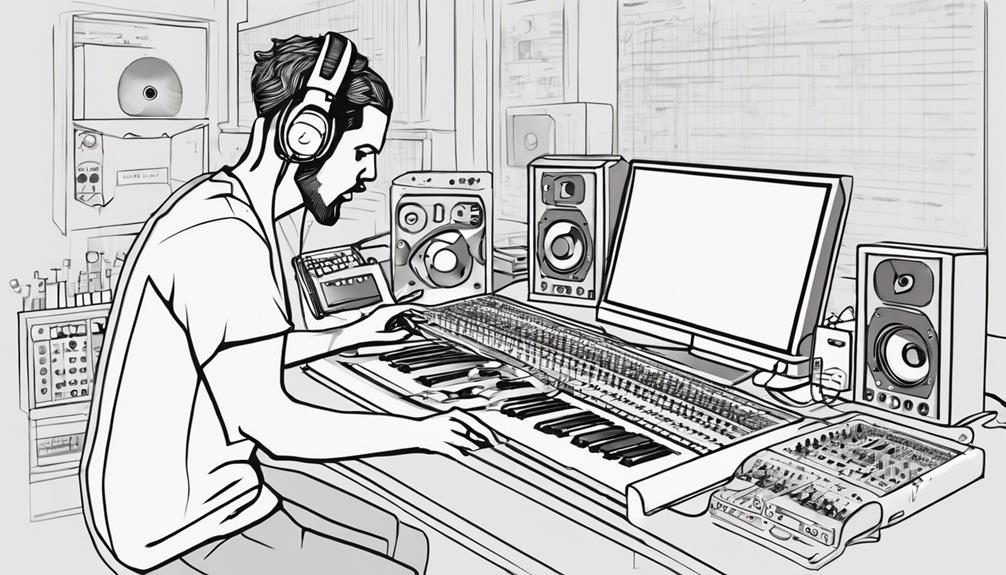
Enhancing your music production skills requires consistent practice and a commitment to mastering your craft. To refine your music production skills effectively, consider experimenting with various techniques, tools, and genres. This will not only expand your skill set but also help you discover new creative avenues. Seeking inspiration from tutorials, blogs, and existing music can provide fresh ideas and approaches to incorporate into your productions.
| Refining Music Production Skills | |
|---|---|
| Practice Regularly | Dedicate time daily to hone your skills. |
| Explore Different Techniques | Experiment with new methods of production. |
| Utilize Various Tools | Familiarize yourself with different software and equipment. |
| Dabble in Different Genres | Broaden your musical horizons for versatility. |
Remember that imperfection is a part of the learning process. Embrace mistakes and failures as opportunities to grow and improve as a music producer. By staying committed to practice and continuously refining your skills, you'll gradually master the art of music production.
Share Your Unique Style

Developing a distinctive style in music production involves experimenting with various genres, sounds, and techniques. To cultivate your unique style, incorporate your personal influences, experiences, and emotions into your music. This infusion of individuality will help create a distinct sound that sets you apart.
Collaborating with other musicians or producers can also enrich your style by blending different perspectives and genres, adding depth to your musical identity. Continuously refining and evolving your style is essential; seek feedback, explore new tools, and stay open to creative growth.
Embrace your authenticity in music production, allowing your unique style to shine through in every track you create. Remember, your musical identity is a reflection of your journey, so be true to yourself and let your individuality shine in your work.
Frequently Asked Questions
How Can I Get Good at Music Production Fast?
To get good at music production fast, focus on consistent daily practice, online tutorials, and collaborating with experienced producers. Master a few key tools and techniques, set specific goals, deadlines, and challenges. Push yourself to enhance your skills rapidly. Dedicate time to analyze and deconstruct your favorite tracks to understand how they were produced, and apply those insights to your own creations. Regularly practice music production techniques, such as mixing, sound design, and mastering, to build confidence and refine your workflow. Remember, growth comes from stepping out of your comfort zone and embracing the learning curve with persistence and enthusiasm.
How Do You Become a Master Music Producer?
To become a master music producer, immerse yourself in the craft. Dedicate time to practice, learn from mentors, and embrace experimentation. Master essential techniques like mixing and sound design. Stay updated with industry trends to continually improve.
How Long Does It Take to Get a Masters in Music Production?
To earn a Master's in Music Production, you typically need 1-2 years, but accelerated programs may finish in as little as 9-12 months. Part-time options can extend it to 2-3 years, and online programs offer flexibility.
How Many Hours Does It Take to Master Music Production?
To master music production, it generally takes around 10,000 hours of focused practice. Consistent dedication and deliberate efforts are key. Progress varies based on talent and efficiency. Investing 20 hours weekly could lead to expertise in 10 years.
Conclusion
Now that you've mastered your craft, you're a music production wizard!
Immerse yourself in your DAW like a fearless explorer, embrace experimentation like a mad scientist, and refine your skills like a master craftsman.
With your unique style shining bright, share your music with the world and watch as your creations take flight like a majestic eagle soaring through the musical skies.
Keep pushing yourself to new heights and who knows, you might just become the next music production legend!
-
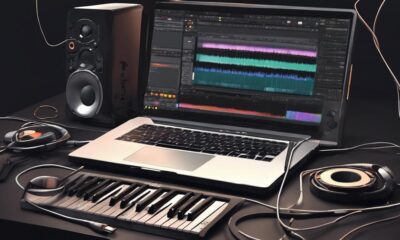
 Vetted6 months ago
Vetted6 months ago10 Best Laptops for Music Production in FL Studio: Top Picks for Beat Makers
-

 Music Production6 months ago
Music Production6 months agoMaria Von Trapp’s Legacy & The Sound of Music
-

 Music Production6 months ago
Music Production6 months agoChristopher Plummer: Legendary Actor’s Legacy
-
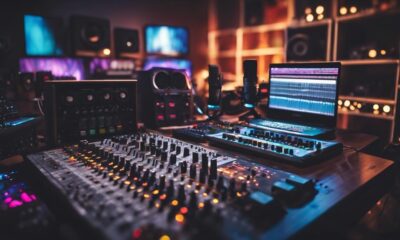
 Vetted6 months ago
Vetted6 months ago15 Best Music Production Blogs Every Music Producer Should Follow
-
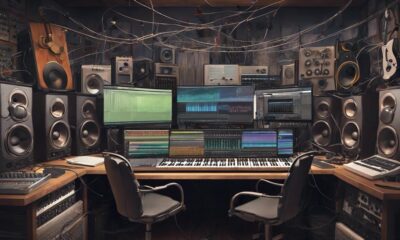
 Vetted6 months ago
Vetted6 months ago15 Best Laptops for Music Production Under $300: Top Budget-Friendly Options
-

 Music Production6 months ago
Music Production6 months agoFind Do-Re-Mi Picnic Meadow Directions Here!
-
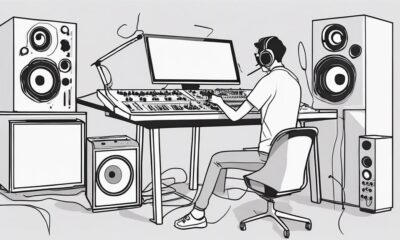
 Music Production5 months ago
Music Production5 months agoHow to Work in Music Production: Start Your Career Today!
-

 Music Production6 months ago
Music Production6 months agoExploring Heather Menzies: Career & Legacy


